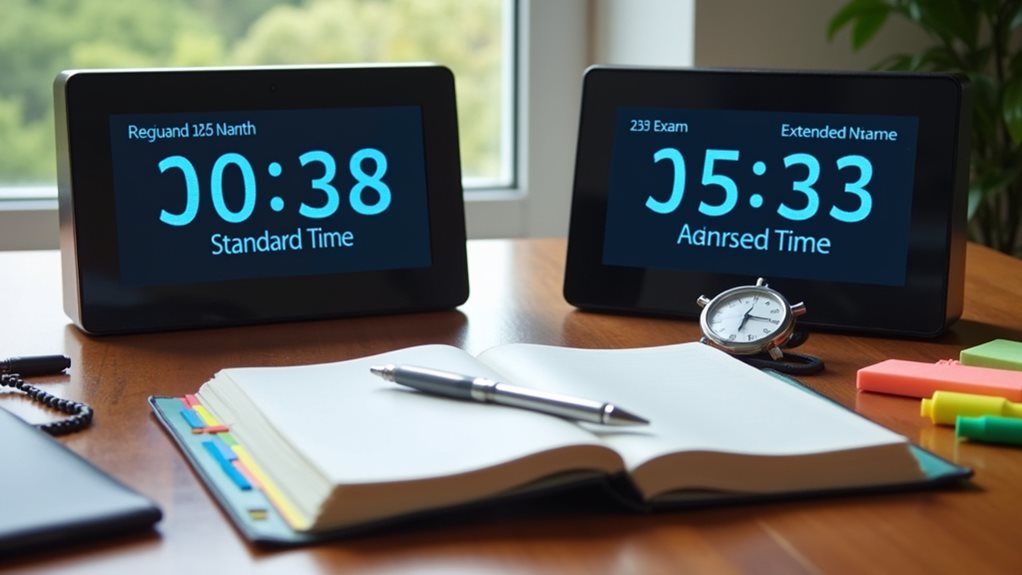To complete your SQE journey, you’ll need to master both the timing and structure of two distinct assessments. SQE1 features two multiple-choice sessions of 180 questions each, requiring about 58 seconds per question, while SQE2 tests practical legal skills through simulated client interactions and document drafting. You’ll have six years to pass both exams, with testing windows available in January/July for SQE1 and April/October for SQE2. Understanding these fundamentals will set the foundation for your thorough preparation strategy.
Key Dates and Assessment Windows for SQE1 and SQE2

The two main components of the Solicitors Qualifying Examination (SQE) operate on distinct assessment schedules that you’ll need to carefully plan around.
Since assessment windows are offered at specific times throughout the year, you’ll want to mark these key dates in your calendar well in advance to guarantee ideal preparation.
While exact dates vary annually, SQE1 typically offers multiple testing windows, with sessions scheduled in January and July.
SQE2’s assessment windows generally occur in April and October, though you should always verify current schedules through the Solicitors Regulation Authority website.
You’ll need to take into account factors like preparation time, work commitments, and potential resit opportunities when planning your exam timeline.
Remember that you must pass SQE1 before attempting SQE2, so factor this sequential requirement into your scheduling strategy. Additionally, candidates have up to six years to complete both SQE1 and SQE2 from their first assessment date.
Format and Duration of Multiple-Choice Examinations
When preparing for SQE1’s multiple-choice assessments, you’ll need to manage your time effectively across two separate examination sessions, each lasting 2 hours and 53 minutes.
The exam formats consist of 180 questions per session, requiring you to maintain a steady pace of approximately 58 seconds per question.
You’ll encounter various question types, including single best answer and scenario-based questions that test your analytical and practical legal knowledge. While some questions may be straightforward, others will require careful consideration of multiple elements.
To optimize your performance, you should practice timing strategies that allow you to identify question patterns quickly. Consider allocating extra time for complex scenarios while moving efficiently through more straightforward items to maximize your scoring potential. Each exam incorporates scenario-based questions that assess your application of legal principles, emphasizing the need for thorough preparation.
Practical Skills Assessments: Timing and Components
Practical skills assessments within SQE2 demand careful attention to multiple timed components, each designed to evaluate your real-world legal capabilities.
The practical assessments focus on testing your ability to handle client interviews, advocacy, legal research, and case analysis under time pressure.
During these skills evaluation sessions, you’ll need to demonstrate proficiency in managing diverse legal scenarios while maintaining professional standards.
Each component typically runs between 30 to 60 minutes, giving you enough time to showcase your expertise in different practice areas.
You’ll encounter simulated client interactions, draft legal documents, and analyze complex case materials – all while adhering to strict time limits.
It’s essential to practice time management strategies before the exam to guarantee you can complete each task effectively. Additionally, preparation for SQE2 generally benefits from practical nature and candidates’ experiences gained after passing SQE1.
Booking Windows and Registration Deadlines

Moving beyond the practical components, successful SQE exam preparation hinges on understanding the registration timeline and booking process.
You’ll need to carefully monitor the SBA’s website for available examination dates and mark your calendar for when booking windows open. The registration process typically begins several months before each assessment period, giving you time to secure your preferred testing slot.
To optimize your booking process, you’ll want to gather all required documentation beforehand and set email alerts for registration deadlines.
Stay ahead by preparing documentation early and setting up alerts – your first step toward successful SQE registration.
Remember that popular testing centers and dates fill quickly, so having your materials ready when registration opens is essential. Following these registration tips will help guarantee you don’t miss out on your preferred examination schedule and can focus on preparation rather than administrative concerns.
Study Timeline Planning and Preparation Periods
Planning your long-term SQE study schedule requires careful consideration of both extensive coverage and strategic time allocation across different exam components. You’ll need to incorporate regular mock exam sessions into your preparation timeline, ensuring you’re comfortable with the actual time constraints you’ll face on exam day. Breaking down your intensive preparation phase into manageable weekly targets will help you maintain steady progress while avoiding last-minute cramming. Additionally, dedicating 15-20 hours per week to your studies is recommended to ensure thorough preparation for both SQE1 and SQE2.
Long-Term Study Schedule
A successful preparation strategy for the SQE exam requires careful consideration of your long-term study timeline, typically spanning 6-12 months before your target exam date.
You’ll need to establish clear long-term goals while gathering essential study resources that align with your learning style and exam requirements.
Begin by dividing your preparation into manageable quarterly phases, focusing on different subject areas and skills in each period.
Map out dedicated time blocks for core topics, practice questions, and mock exams, ensuring you’ve allocated sufficient hours for both learning and revision.
It’s vital to build flexibility into your schedule to accommodate unexpected challenges or areas where you might need additional practice.
Remember to incorporate regular assessment points to track your progress and adjust your study plan accordingly. Additionally, most candidates spend 3 to 6 months on focused preparation to ensure they’re well-prepared for the exam.
Mock Exam Time Management
Effective mock exam practice forms the cornerstone of your SQE preparation timeline, demanding strategic planning and dedicated preparation periods.
You’ll need to master specific mock exam strategies and time allocation techniques to simulate actual exam conditions accurately. Understanding how to manage your practice sessions guarantees you’re well-prepared for the real assessment.
- Schedule at least three full-length mock exams, spacing them 2-3 weeks apart to allow for review and improvement.
- Implement strict time allocation during practice, mirroring the actual exam’s timing requirements.
- Analyze your performance metrics after each mock exam to identify areas needing additional focus.
- Create a feedback loop by documenting your time management challenges and adjusting your approach accordingly.
Your success depends on treating these practice sessions with the same intensity as the actual exam. Moreover, it’s essential to consider the recommended 40 hours per week commitment for comprehensive preparation, as this can significantly impact your readiness for SQE1.
Intensive Prep Phase Breakdown
Building on your mock exam experience, successful SQE preparation requires breaking down your intensive study phase into manageable segments.
You’ll want to structure your preparation into distinct periods, allocating specific time blocks for core subjects and practice questions.
Create a detailed 12-week intensive study schedule that prioritizes your weaker areas while maintaining proficiency in stronger topics. During this phase, you’ll need to dedicate 4-6 hours daily to focused learning, combining both active recall techniques and practice assessments. Incorporating spaced repetition into your study routine can further enhance your retention of complex material.
Adapt your preparation strategies based on your progress tracking, and don’t hesitate to adjust your timeline when necessary.
Remember to incorporate regular review sessions every two weeks to reinforce your understanding and identify any remaining knowledge gaps that require additional attention.
Results Release Schedule and Next Steps
Once you’ve completed your SQE exam, you’ll naturally want to know when to expect your results and what steps lie ahead. Since I don’t have factual information about SQE exam timings, I can’t provide specific details about results release schedules.
However, I’d recommend staying in close contact with your examination authority for accurate timing information.
Stay connected with your exam authority – they’re your most reliable source for timely, accurate results information.
- Keep all examination documentation and reference numbers readily available for results interpretation
- Monitor the official SQE communication channels for updates about your results timeline
- Begin planning your next steps while waiting, whether that’s preparing for another assessment or moving forward with qualification
- Connect with your support network, including mentors and fellow candidates, who can provide guidance during this period
Remember to maintain your professional development during the waiting period.
Special Arrangements and Time Accommodations

While maneuvering through the SQE exam process, you’ll find that certain candidates may qualify for special arrangements and time accommodations based on specific needs or circumstances.
If you have special needs or require exam flexibility, you’ll need to submit supporting documentation well in advance of your test date. These accommodations might include extra time, specialized equipment, or modified exam formats.
You’ll want to contact the SRA directly to discuss your specific situation and understand the available options.
Remember that each case is reviewed individually, and the goal is to guarantee fair access while maintaining exam integrity.
Don’t hesitate to request accommodations if you need them – the assessment aims to evaluate your legal knowledge and skills, not test your ability to overcome physical or cognitive barriers.
Frequently Asked Questions
Can I Retake Only Specific Failed Components of SQE1 or SQE2?
Yes, you can retake specific failed components of either SQE1 or SQE2. The retake policies allow you to choose which component options to resit, but you’ll need to complete all components within six years.
What Happens if My Internet Connection Fails During an Online Assessment?
Like a lifeline suddenly cut, internet issues can disrupt your exam flow. Don’t panic – assessment protocols allow you to reconnect and continue. If problems persist, you’ll need to contact the exam provider immediately.
Are There Practice Exams Available That Mirror the Exact Timing Format?
You’ll find official exam simulations that match exact timing formats through SQA’s website. Practice these regularly to develop your timing strategies and build confidence in managing the actual assessment’s strict time constraints.
How Many Times Can I Postpone My Scheduled SQE Examination Dates?
You can postpone your SQE exam dates once per assessment, subject to scheduling availability and postponement policies. You’ll need to notify the SRA at least three weeks before your scheduled exam date.
Does Work Experience Gained Before Taking SQE Count Toward Qualification Requirements?
Did you know 80% of candidates gain experience before SQE? You can count qualifying work completed before, during, or after your SQE assessments, as long as it meets the required standards for work experience.
Final Thoughts
Like a marathon runner preparing for race day, you’ll need careful planning to navigate the SQE exam timeline successfully. Understanding the assessment windows, booking deadlines, and exam formats isn’t just helpful – it’s essential for your success. You’ve now got the key information to create your study schedule, manage your time effectively, and tackle both the multiple-choice and practical components with confidence. Take these insights and make them work for you.


